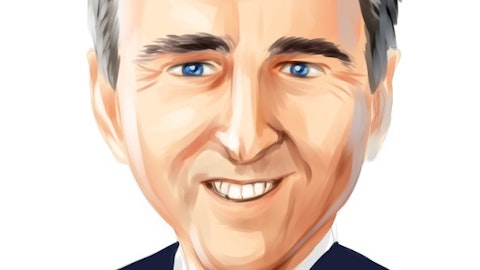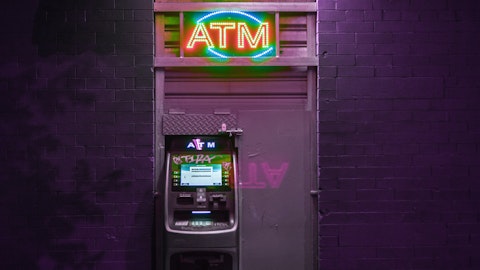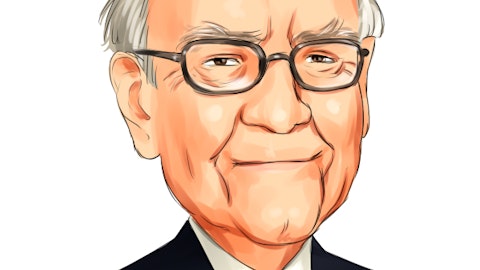Andy Cecere: Hey, Mike.
Q €“ Mike Mayo: AOCI, was it €“ I’m just going to remember here, $12 billion, now it’s $8 billion? And where is it as of today?
Terry Dolan: AOCI overall is at $10 billion at the end of the year and expect it to come down from there.
Andy Cecere: At a lower level today, Mike.
Mike Mayo: And then, Andy, just can you pull the lens back a little bit? It’s been a rough 3, 5 and 10 years when you look at operating leverage in stock, not last year on the operating leverage. But that comment you made in December and you addressed briefly, but you’ve been in this investment cycle multi-years. And now you said that, you’re coming out of it or the drag is less or maybe the spending is less and the payoffs are more. Can you just give us more color on both the spending side and the payback side and where you’ve invested the most and where you expect that payback? Because it sounds like you’re crossing a line based on your comments from December and that you reiterated today? Thanks.
Andy Cecere: Yes. Thanks, Mike. I think that’s a fair representation. So we €“ our spend levels on pure CapEx were €“ grew from about $800 million to $900 million to $1.2 billion, $1.3 billion. And that growth has been in the run rate for the last couple of years. So you would not expect to see additional continued expense increase related to CapEx. Importantly, we also migrated that spend from about 60% defensive to 60% offensive. So the spend is on activities like digital capabilities, reaching customers, products and services and so forth. So all of that is what’s coming through to right now, so a level set on the expense side plus a return on the investments from a revenue side. That, coupled with overlaying all that on the Union Bank customer base, is why we’re projecting the numbers that we’re giving you.
Mike Mayo: Okay. Thank you.
Andy Cecere: Thanks, Mike.
Operator: We do have time for one more question. And we’ll go to John McDonald with Autonomous Research. Please go ahead.
Andy Cecere: Good morning, John.
John McDonald: Good morning, guys. Hey. Just a couple of quick follow-ups. So Terry, where does the balance sheet repositioning and the merger leave you in terms of interest rate positioning? How would you describe it here, fairly neutral, a little bit asset-sensitive, where you’re ending up now?
Terry Dolan: Yeah. I would say that, legacy US Bank is fairly neutral. When we add Union Bank on, it probably adds about 50 basis points of asset sensitivity in a 50 up sort of shock environment.
John McDonald: Okay. And then on the fee income, you said some more tailwinds this year, some helpers on legacy U.S. Bancorp. What are those on the fee income front? What are the helpers this year that you can grow fee income? Maybe just puts and takes on fees real quick.
Terry Dolan: Yes. Well, if you just kind of look at the different components, I think the payments revenue continues to be reasonably strong. I think that the expectation is the market comes back a little bit in terms of investment income. But deposit service charges, we saw a drag in 2022 because of some pricing changes we implemented in May. That starts to dissipate. So, I think it will be kind of a combination of things. But probably one of the biggest ones is just mortgage banking revenue. That has been a pretty significant drag, especially on a year-over-year basis. And in the fourth quarter, we actually started see that inflection point with linked-quarter revenue starting to come up, and we would expect that to be a little bit stronger as we go into 2023.
John McDonald: Okay, got it. And then the last clarification. I think on reserves, you said the 1.9% ratio looks pretty good for this year. And even if unemployment went to 6%, 6.5%, you’d be okay?
Terry Dolan: Yes. Again, we go through a lot of different scenarios and we take that downside into consideration and as part of kind of that weighted average process. We think 6%, 6.5% unemployment is already incorporated into our reserving process. So, — but again, it all is going to depend upon what ends up happening, how severe the economic recession is, if there is one at all. So, I think there’s just a lot of moving parts.
John McDonald: Got it. Thank you.
Operator: And we have no further questions at this time. I will now turn it back to George Andersen. Please continue.
George Andersen: Thank you for listening to our call. Please contact the Investor Relations department if you have any follow-up questions.
Operator: And that does conclude today’s conference. Thanks for your participating. You may now disconnect.
Follow Us Bancorp (NYSE:USB)
Follow Us Bancorp (NYSE:USB)
Receive real-time insider trading and news alerts





